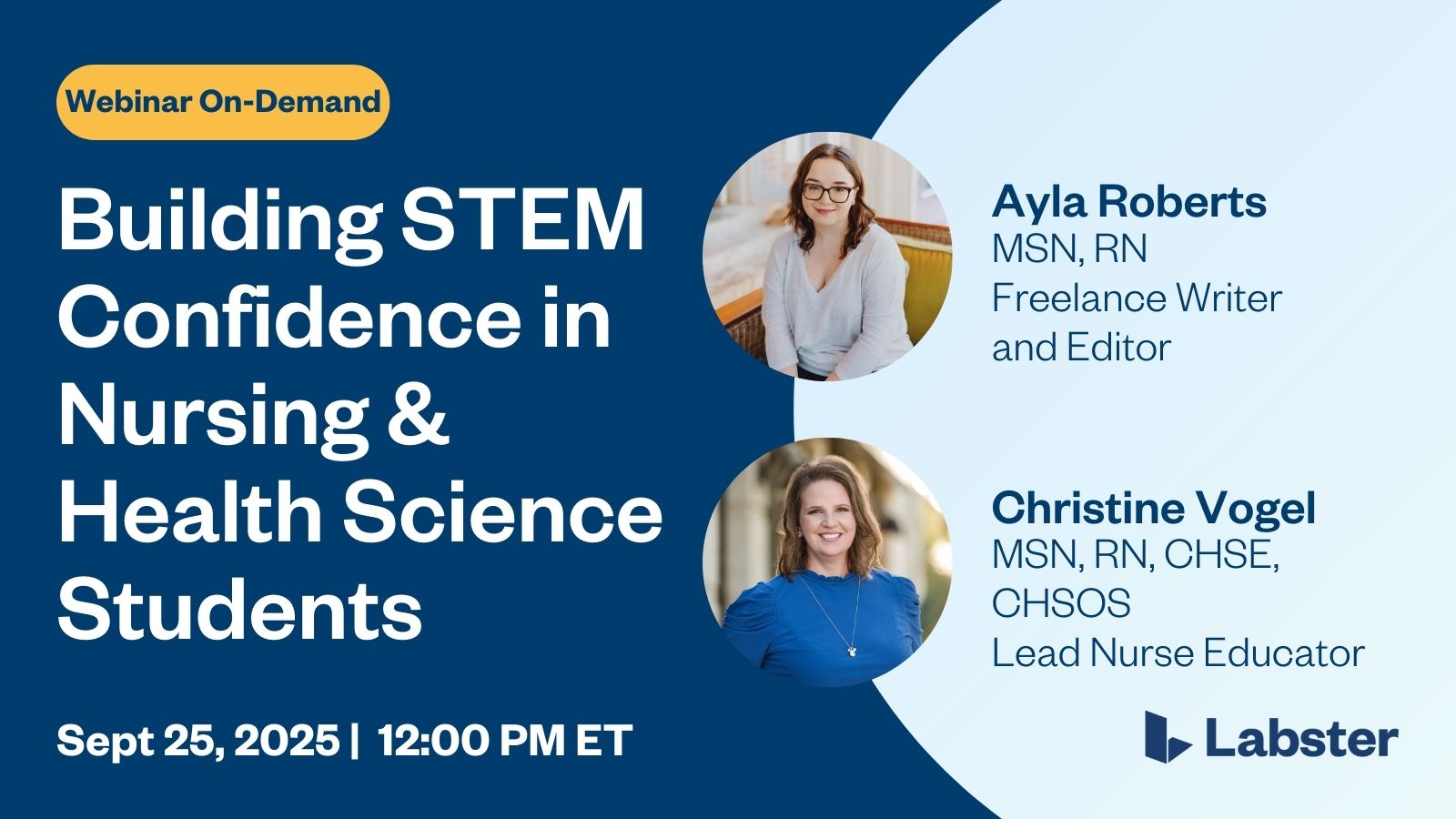University of Essex: Preparing STEM Students for University with Virtual Labs

Author
Table of Contents
Name of the heading
The Life Sciences 4 year integrated degree program was first launched at the University of Essex in 2018. The program includes a Foundation year that aims to strengthen students' academic skills before entering Year 1 of their degree. Dr. Victoria Allen-Baume is one of the lecturers for this relatively new course, which has seen a student intake that has increased four times in size and successfully integrated Labster’s virtual labs into both Chemistry and Biology modules. Read on to find out how Labster was used as a valuable resource to accommodate a growing student intake, close the knowledge gap in a classroom of varying educational backgrounds, and how virtual labs help better prepare students entering their first year of university.
Preparing pre-university students with virtual labs
The Life Sciences foundation pathway includes courses in both Chemistry for Biology and General Biology, altogether forming Year 0 on the Life Sciences integrated degree program at the University of Essex. Students in the foundation course typically have a wide range of educational backgrounds and lab experience, as Dr. Allen-Baume explains: “Being a foundation pathway we don't have the traditional A-level students that you'd have in the first year of a university degree, we have a far wider range of experience. Some of them have not studied the requisite subjects to go into biosciences, some just haven't done as well as they needed to get into Year One, while others have undertaken more vocational courses. We also need to cater for a wide range of interests, being the year 0 course for a wide range of degree courses, including Marine Biology, Biochemistry, Genetics, Biomedical sciences & Biological sciences.”
“Some students have lots of lab experiences, and some have very little. So, in terms of practical skills, it's really helpful to let them practice things that we might be doing in a real lab later on, or just to refresh and update their skills.”
Students in the foundation course have one year to reach the required knowledge level to enter year 1 of their university degree. With Labster’s virtual labs, Dr. Allen-Baume has found the extra support that students need to meet this standard. “Some students have lots of lab experiences, and some have very little. So, in terms of practical skills, it's really helpful to let them practice things that we might be doing in a real lab later on, or just to refresh and update their skills.”
Labster had been integrated as part of the Life Sciences foundation course since its beginning, and implementing the virtual labs into Moodle, their learning management system (LMS) was smooth-sailing: “The Labster team has made it very easy for me to incorporate the simulations into our LMS. Any small changes or adjustments as we found our way have been made quickly and the IT support for implementation was invaluable.”
Supplementing limited lab time for a growing student intake
Though the course is a relatively new offering at the University of Essex, it might already be a victim of its own success with intake growing from 20 students in 2018 to 69 students in 2019. Yet Dr. Allen-Baume has easily scaled up her class with Labster’s resources by teaching in smaller groups to ensure students have the support they need.
In the Biology and Chemistry for Biology modules, students have two hours of wet labs per week. To supplement these, Dr. Allen-Baume uses Labster in-class as pre- and post-lab exercises, as well as revision material for exam preparation. Students also have the option to access the simulations at any time through their LMS.
“With limited time and space we can only provide a certain number of wet lab opportunities for our students. However, Labster allows them infinite tries at various practical scenarios, with no risk of harm if they get it wrong and no detrimental impact on their marks. We have the ability to do experiments that we would just not have the time, space or equipment to do in the ‘real world’.”
Having easy access to Labster’s resources means students benefit from this tool to engage in lab exercises where they can put their knowledge into practice and contextualize their learning. The ability to safely repeat experiments and practice their skills is one advantage that Dr. Allen-Baume has highlighted: “With limited time and space we can only provide a certain number of wet lab opportunities for our students. However, Labster allows them infinite tries at various practical scenarios, with no risk of harm if they get it wrong and no detrimental impact on their marks. We have the ability to do experiments that we would just not have the time, space or equipment to do in the ‘real world’.”
Feedback from students has also been overwhelmingly positive, with many appreciating the visual aspects of virtual labs and the ability to learn at their own pace and contextualize their learning. Some student comments from a survey on the use of Labster includes:
- “I can relate it to exam questions because I can see the experiment in my head before the lab.”
- “It was so useful to see the experiments in practice and have context for things.”
- “It’s great for visual learners like me.”
- “Has a realistic feel to it and tells me relevant and useful information relating to my course.”
- “I can practice my lab skills without any risks.”
- “Labster is a great platform to learn practicals without any real-life risks.”
- “I enjoy it as you can catch up on practicals and carry out experiments from home.”
- “I have really enjoyed using this study resource in my Foundation year at University!”
Dr. Allen-Baume has also observed a marked improvement in her students’ lab work and attributed them to regular practice with the virtual labs: “I think students generally feel that the simulations give them a lot more confidence when they're actually in the lab. I have also noticed that they seem to get through actual lab work a lot more quickly, which is great because I can then include more experimentation when we’re actually in the lab. I think a lot of that comes from Labster giving them that bit of practice and familiarization.”
Driving student engagement with a range of virtual labs
The virtual labs are popular with her students, and Dr. Allen-Baume hopes to continue to use Labster in her course due to the constantly growing number of simulations available in the simulation catalog. She says, “We’re going to keep using it. Now I've got so many more simulations to draw from , I can use it more for preparation for experiments they will have the chance to do in the real lab. It's been really helpful that a lot more chemistry simulations were added; I find that generally the AP level is around the correct level for my students.”
Labster now offers more simulations than ever for pre-university students, and Dr. Allen-Baume sees these updates as a significant step in keeping up with the ever-evolving challenges of science education: “Students have information technology as an integral part of their life and we have to keep up with these changes to make sure we can keep them engaged. Labster is constantly updating the range of simulations available. Judging by the webinar I joined recently, the virtual reality possibilities are really exciting.”
So does Dr. Allen-Baume recommend Labster? She says, “Yes! I would enthusiastically recommend Labster to others. It has provided our students with a very valuable learning tool, giving them more transferable skills and helping them to contextualize their own learning.”
FAQs
Heading 1
Heading 2
Heading 3
Heading 4
Heading 5
Heading 6
Lorem ipsum dolor sit amet, consectetur adipiscing elit, sed do eiusmod tempor incididunt ut labore et dolore magna aliqua. Ut enim ad minim veniam, quis nostrud exercitation ullamco laboris nisi ut aliquip ex ea commodo consequat. Duis aute irure dolor in reprehenderit in voluptate velit esse cillum dolore eu fugiat nulla pariatur.
Block quote
Ordered list
- Item 1
- Item 2
- Item 3
Unordered list
- Item A
- Item B
- Item C
Bold text
Emphasis
Superscript
Subscript





